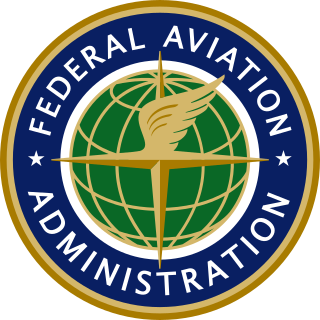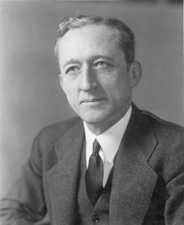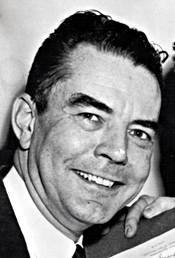
The Federal Aviation Administration (FAA) is the largest transportation agency of the U.S. government and regulates all aspects of civil aviation in the country as well as over surrounding international waters. Its powers include air traffic control, certification of personnel and aircraft, setting standards for airports, and protection of U.S. assets during the launch or re-entry of commercial space vehicles. Powers over neighboring international waters were delegated to the FAA by authority of the International Civil Aviation Organization.

The United States Department of Transportation is one of the executive departments of the U.S. federal government. It is headed by the secretary of transportation, who reports directly to the president of the United States and is a member of the president's Cabinet.
The Air Commerce Act of 1926 created an Aeronautic Branch of the United States Department of Commerce. Its functions included testing and licensing of pilots, certification of aircraft and investigation of accidents.

The Civil Aeronautics Board (CAB) was an agency of the federal government of the United States, formed in 1938 and abolished in 1985, that regulated aviation services and conducted air accident investigations. The agency was headquartered in Washington, D.C.

Jennings Randolph was an American politician from West Virginia. A Democrat, he was most notable for his service in the United States House of Representatives from 1933 to 1947 and the United States Senate from 1958 to 1985. He was the last living member of the United States Congress to have served during the first 100 days of Franklin D. Roosevelt's administration. Randolph retired in 1985, and was succeeded by Jay Rockefeller.

The 85th United States Congress was a meeting of the legislative branch of the United States federal government, composed of the United States Senate and the United States House of Representatives. It met in Washington, D.C. from January 3, 1957, to January 3, 1959, during the fifth and sixth years of Dwight Eisenhower's presidency. The apportionment of seats in the House of Representatives was based on the 1950 United States census.

The 80th United States Congress was a meeting of the legislative branch of the United States federal government, composed of the United States Senate and the United States House of Representatives. It met in Washington, D.C. from January 3, 1947, to January 3, 1949, during the third and fourth years of Harry S. Truman's presidency. The apportionment of seats in this House of Representatives was based on the 1940 United States census.

The 79th United States Congress was a meeting of the legislative branch of the United States federal government, composed of the United States Senate and the United States House of Representatives. It met in Washington, D.C., from January 3, 1945, to January 3, 1947, during the last months of Franklin D. Roosevelt's presidency, and the first two years of Harry Truman's presidency. The apportionment of seats in this House of Representatives was based on the 1940 United States census.

Bottled in bond (BIB) is a label for an American-produced distilled beverage that has been aged and bottled according to a set of legal regulations contained in the United States government's Standards of Identity for Distilled Spirits, as originally specified in the Bottled-in-Bond Act of 1897. As a reaction to widespread adulteration of American whiskey, the act made the federal government the guarantor of a spirit's authenticity, gave producers a tax incentive for participating and helped ensure proper accounting and the collection of tax that was due. Although the regulations apply to all spirits, most bonded spirits are whiskeys in practice.

Carl Atwood Hatch was a United States senator from New Mexico and later was a United States district judge of the United States District Court for the District of New Mexico.

The Civil Aviation Authority of the Philippines is the civil aviation authority of the Philippines and is responsible for implementing policies on civil aviation to assure safe, economic and efficient air travel. The agency also investigates aviation accidents via its Aircraft Accident Investigation and Inquiry Board. Formerly the Air Transportation Office, it is an independent regulatory body attached to the Department of Transportation for the purpose of policy coordination.

John William Byrnes was an American politician who served as a U.S. representative from Wisconsin.
Title 49 of the United States Code is a positive law title of the United States Code with the heading "Transportation."
The Airport Improvement Program is a United States federal grant program that provides funds to public use airports to help improve safety and efficiency. Improvement projects relate to runways, taxiways, ramps, lighting, signage, weather stations, NAVAIDs, land acquisition, and some areas of planning. The program is managed by the Federal Aviation Administration.

The Airport and Airway Development Act of 1970 was a United States federal law passed during the 91st Congress, and signed into law by President Richard Nixon in conjunction with the Airport and Airway Revenue Act on May 21, 1970. The act was meant to fill funding gaps in the airport and airway system, which had become inadequate due to the rapid growth of aviation. The legislation was estimated to generate greater than $11 billion in funds,

The Federal Aviation Act of 1958 was an act of the United States Congress, signed by President Dwight D. Eisenhower, that created the Federal Aviation Agency and abolished its predecessor, the Civil Aeronautics Administration (CAA). The act empowered the FAA to oversee and regulate safety in the airline industry and the use of American airspace by both military aircraft and civilian aircraft.

The Federal Seed Act, P.L. 76-354, requires accurate labeling and purity standards for seeds in commerce, and prohibits the importation and movement of adulterated or misbranded seeds. The law works in conjunction with the Plant Protection Act of 2000 to authorize the Animal and Plant Health Inspection Service (APHIS) to regulate the importation of field crop, pasture and forage, or vegetable seed that may contain noxious weed seeds. USDA's Agricultural Marketing Service is responsible for enforcing the labeling and purity standard provisions.

Oklahoma Beer Act of 1933 is a United States public law legalizing the manufacture, possession, and sale of low-point beer in the State of Oklahoma. The Act of Congress cites the federal statute is binding with the cast of legal votes by the State of Oklahoma constituents or legislative action by the Oklahoma Legislature.
Transportation in the United States is governed by laws and regulations of the federal government. The Department of Transportation is responsible for carrying out federal transportation policy, and the Department of Homeland Security is responsible for security in transportation.










